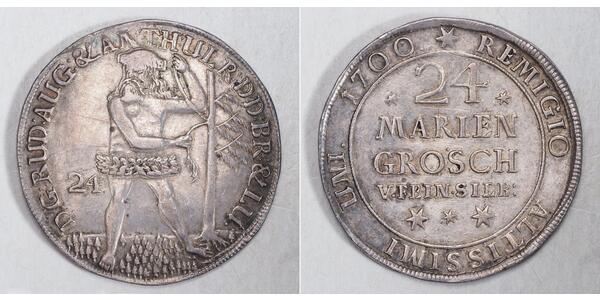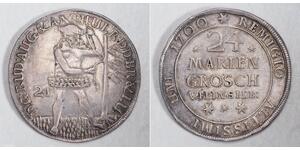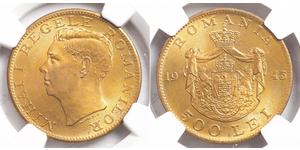(售价 $96.0)
1700, Brunswick-Wolfenbuttel, Rudolph Augustus & Anthony Ulrich. Large Silver 24 Mariengroschen (2/3 Thaler) Coin.
Mint Year: 1700
Reference: KM-559.
Denomination: 24 Mariengroschen (2/3 Thaler)
Condition: Struck with broken obverse dies, old scratches in reverse, otherwise a nicely centerd XF!
Weight: 13.06gm
Diameter: 37mm
Material: Silver
The wild man (also wildman, or "wildman of the woods") is a mythical figure that appears in the artwork and literature of medieval Europe, comparable to the satyr or faun type in classical mythology and to Silvanus, the Roman god of the woodlands. The defining characteristic of the figure is its "wildness"; from the 12th century they were consistently depicted as being covered with hair. Images of wild men appear in the carved and painted roof bosses where intersecting ogee vaults meet in the Canterbury Cathedral, in positions where one is also likely to encounter the vegetal Green Man. The image of the wild man survived to appear as supporter for heraldic coats-of-arms, especially in Germany, well into the 16th century. Renaissance engravers in Germany and Italy were particularly fond of wild men, wild women, and wild families, with examples from Martin Schongauer (died 1491) and Albrecht Dürer (1471–1528) among others.
The Principality of Brunswick-Wolfenbüttel was a principality within the Duchy of Brunswick-Lüneburg, whose history was characterised by numerous divisions and reunifications. Various dynastic lines of the House of Welf ruled Brunswick-Wolfenbüttel until the dissolution of the Holy Roman Empire in 1806. As a result of the Vienna Congress, its successor state, the Duchy of Brunswick, was created in 1814.
Rudolph Augustus (16 May 1627 – 26 January 1704), a member of the House of Welf, was Duke of Brunswick-Lüneburg and ruled as Prince of Brunswick-Wolfenbüttel from 1666 until his death. In 1685 he made his younger brother Anthony Ulrich co-ruler.
Anthony Ulrich (German: Anton Ulrich; 4 October 1633, Hitzacker – 27 March 1714, Salzdahlum) was duke of Brunswick-Lüneburg and ruled over the Wolfenbüttel subdivision of the duchy from 1685 until 1702 jointly with his brother, and solely from 1704 until his death.
Anthony Ulrich was the second son of Augustus the Younger, Duke of Brunswick-Lüneburg; he studied at the University of Helmstedt. After their father's death in 1666, Rudolph Augustus, Anthony Ulrich's elder brother, became reigning duke and made Anthony Ulrich his proxy. In 1685, Rudolph Augustus made Anthony Ulrich a coregent with equal rights; Rudolph Augustus had little interest in government affairs and left most decisions to his brother.
After the Hanover subdivision of the duchy had received a new prince-electorship from the Emperor in 1692, tensions between the two states rose, as both Anthony Ulrich and Rudolph Augustus were dismayed that they had not received the electorship. While both Hanover and Lüneburg sided with Emperor Leopold I in the War of the Spanish Succession, Anthony Ulrich decided to enter into an agreement with France. This led to Hanover and Lüneburg invading the Principality of Wolfenbüttel in March 1702; Anthony Ulrich was almost captured while travelling from Wolfenbüttel to Brunswick. By order of the Emperor, Anthony Ulrich was deposed as duke against his brother's protestations, and Rudolph Augustus remained as the only ruler, while Anthony Ulrich fled to Saxe-Gotha. In April 1702, Rudolph Augustus signed a treaty with Hanover and Lüneburg that Anthony Ulrich later agreed to.
After Rudolph Augustus' death in 1704, Anthony Ulrich took over government again. He continued to settle various disputes with Hanover, until a final agreement between the two sister principalities was reached in 1706.
In 1709, Anthony Ulrich converted to the Roman Catholic Church, but guaranteed to his subjects that this would not influence his government, although he allowed the opening of the first Catholic church in his state. He died at Schloss Salzdahlum, which he had built, in 1714, and was succeeded by his eldest surviving son, Augustus William.
Anthony Ulrich is known as a supporter of scholarship and the arts. He significantly extended the Bibliotheca Augusta, a library founded by his father. He hired the philosopher Leibniz as a librarian, and was a supporter of Anton Wilhelm Amo, the first black Doctor of Philosophy in Europe. He wrote two novels and a number of poems, and had a large art collection, which later became the foundation of the Herzog Anton Ulrich Museum (Duke Anthony Ulrich Museum).
500 Leu 羅馬尼亞 黃銅
本组有 2 钱币 / 1 售价
⇑





 English
English













